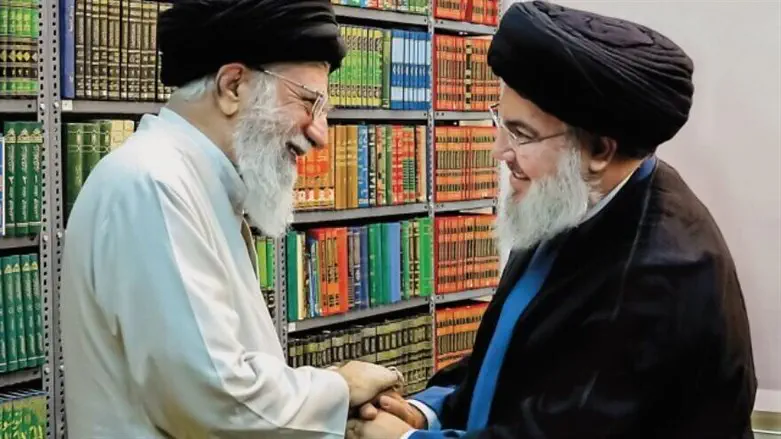
Erfan Fard is a counter-terrorism analyst and Middle East Studies researcher based in Washington, DC. an expert in Middle Eastern regional security affairs with a particular focus on Iran, Counter terrorism, IRGC, MOIS and Ethnic conflicts in MENA. He graduated in International Security Studies (London M. University, UK), and in International Relations (CSU-LA). He is fluent in Persian, Kurdish, Arabic and English. / Follow him in this twitter account @EQFARD
The Islamic Republic of Iran stands at a crossroads, marked by its profound disconnect from the global march towards human rights. This regime, entrenched in power for over four decades, has systematically prioritized ideological dogmatism over the well-being and aspirations of its people. Its policies—both domestic and international—have not only stifled the voices of its citizens but have also posed a continuous threat to regional peace and global stability.

Iran's governance, characterized by autocratic rule, suppression of dissent, and egregious human rights abuses, underscores a clear and present need for change. The regime's relentless pursuit of nuclear capabilities, coupled with its support for proxy militias across the Middle East, exemplifies its disregard for international norms and the security of its neighbors. These actions, taken in the name of preserving theocratic rule, have isolated Iran, drawing severe economic sanctions and diplomatic isolation, which in turn, have plunged the Iranian populace into economic hardship and social unrest.
The call for regime change is, therefore, not merely political rhetoric but a clarion call for fundamental human rights and dignity. The international community's response must be calibrated and multifaceted, aiming not only to dismantle the oppressive structures of the regime but also to pave the way for a democratic and peaceful Iran. This involves strategic economic sanctions targeted at the regime's lifelines, diplomatic endeavors to isolate it further on the international stage, and robust support for a unified and democratic opposition.
However, the path to regime change is fraught with complexities. It demands a nuanced understanding of Iran's political landscape, a commitment to non-interventionist principles, and a concerted effort to empower the Iranian people to lead the charge for change. The goal should not be to impose a new order from the outside but to support the Iranian populace in their quest for a government that reflects their aspirations, respects human rights, and adheres to democratic principles.
Moreover, the narrative surrounding regime change must be reframed. It is not a call for military intervention but a plea for the international community to stand in solidarity with the Iranian people. It is a challenge to global powers to rethink their strategies, ensuring that their actions do not exacerbate the suffering of the Iranian people but instead contribute to a peaceful transition of power.
In the complex geopolitical landscape, Saudi Arabia and Israel have made attempts to engage with high-ranking Iranian military officials and ministers, seeking to shift the balance of power internally; however, these efforts have been systematically rebuffed by the regime, showcasing the challenges of influencing Iran's tightly controlled political structure.
Restoring relations between Iran and the United States to their pre-1979 status presents a significant strategic advantage for both Israel and the U.S., fundamentally reshaping the Middle Eastern geopolitical landscape. Prior to the Iranian Revolution, the U.S. and Iran maintained a close alliance that facilitated regional stability, advanced mutual economic interests, particularly in oil, and provided a counterbalance to Soviet influence.
For Israel, a détente between the U.S. and a post-regime Iran could herald a new era of diplomatic possibilities and security dynamics.
A normalization of ties could lead to Iran distancing itself from anti-Israeli groups, reducing security threats to Israel and potentially paving the way for dialogue or indirect cooperation on shared regional concerns. For the U.S., re-established relations with Iran could unlock significant economic opportunities, enhance energy security, and contribute to a more stable Middle East, benefiting U.S. strategic interests and allies, including Israel.
Moreover, such a change could facilitate a broader regional realignment, with Iran potentially rejoining the international community as a constructive actor, contributing to counter-terrorism efforts, and stabilizing regional flashpoints. This scenario would not only benefit U.S. and Israeli strategic interests but also offer a pathway to resolving long-standing regional conflicts and fostering a more secure and prosperous Middle East.
In envisioning a post-regime Iran, we must look towards a future that holds the regime accountable for its actions, respects the sovereignty and territorial integrity of Iran, and ensures the establishment of a democratic system. This new Iran would not only mend its relations with the international community but also play a constructive role in regional stability and global peace.

The necessity of regime change in Iran is, therefore, evident. It transcends political ideologies and represents a fundamental aspiration for freedom, dignity, and peace. The international community, guided by a principled approach and a commitment to the Iranian people's aspirations, must play a supportive role in this historic transition. The path ahead is undoubtedly challenging, but the pursuit of a democratic, peaceful, and prosperous Iran is a cause worth championing.
In conclusion, regime change in Iran is imperative for the well-being of its people and the stability of the region. It is a call for freedom, a demand for justice, and a step towards a more peaceful world. The international community must stand in solidarity with the Iranian people, supporting their rightful aspirations for democracy and human dignity.